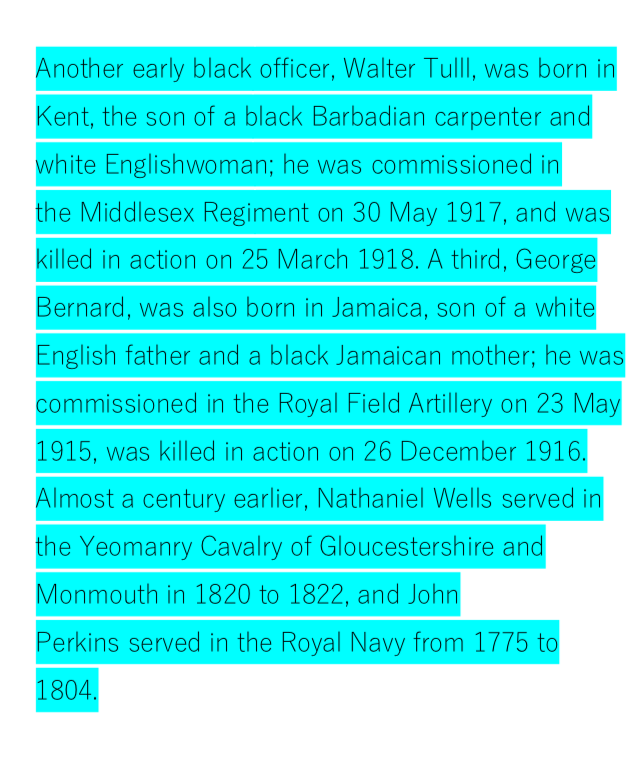David L. Clemetson
Article from Wikepedia
While not the first man of colour to be part of the regular British Army David Clemetson appears to have been the first to have been commissioned as such, a full two years before Walter Tull and just shortly before George Bernard. John Perkins and Nathaniel Wells served as enlisted military men.
David clemetson with the trinity college, cambridge university rowing team
"Lt. David Louis Clemetson (1893-1918) was one of a very small number of black officers serving in the British military during WWI."
David "matriculated in 1912, becoming a Law student at Trinity College. He would leave after only two years of his degree, however, never to complete it; instead, he enlisted to fight in the First World War."
"Clemetson was born in Port Maria, in Saint Mary Parish, Jamaica. He was the son of David Robert Clemetson and his wife Mary, of the Frontier Estate sugar plantation (the starting point of the slave rebellion known as Tacky's War in 1760). His grandfather, Robert Clemetson, had been a slave, but he was also the son of his owner; he was freed by his father and inherited the plantation, becoming one of the wealthy elite on the island. He was elected to the House of Assembly of Jamaica in 1840 (Wikepedia 9/9/18)"
The following is research by Trinity Library and College staff and per an article published in the May 2017 publication of "The Cambridge Student."
"Lt Clemetson, who rowed as part of the rugby club boat in Lent bumps during his time at the University, first joining the Sportsmen’s Battalion of the Royal Fusiliers before becoming an Officer with the Pembroke Yeomanry in 1915 – a position that was more difficult for him to obtain than might now appear. In 1914, the Manual of Military Law enforced restrictions on non-citizens of Britain and black soldiers from command roles in the British Expeditionary Force; indeed, it prevented “any negro or person of colour” being promoted above a Sergeant. This was a rule that was explicitly brandished to potential recruits: “Are you of pure European descent?” was the question they were faced with. Lt Clemetson, a Jamaican, did not lie as records show some did to overcome this racism; staying true to his identity, Clemetson was able to take the position of Second Lieutenant.
He was sent to the frontline in Salonika, the Macedonian Front, where he remained for eight months before being evacuated to Malta. Like many soldiers during the war, Lt Clemetson was suffering from what we now know to be post-traumatic stress disorder, and so he was first sent to a military hospital in Malta and then on to the Craiglockhart psychiatric hospital – although he only reached his destination after the ship he was aboard, the Dover Castle, was torpedoed. It was while he was at Craiglockhart, in 1917, that he was notified he was being promoted to First Lieutenant.
Lt Clemetson was only allowed two months respite at Craiglockhart, and then three weeks leave before he had to rejoin the 24th Welsh Regiment of the Pembroke Yeomanry. Tragically, he died only 52 days before the end of the war, aged just 25. Posthumously awarded both the Victory and British War Medals, Lt Clemetson showed bravery not only fighting in the war, but also in fighting against the racism in the military at the time."
.
"While the Allied forces were joined by hundreds of thousands of soldiers from British Dominions and Crown Colonies such as the West Indies, India, Pakistan, South Africa and Nigeria, Clemetson was one of a very small number of black officers in the British Army itself. The 1914 Manual of Military Law restricted black soldiers and those who were not citizens of Britain from command in the BEF. However, Clemetson and a handful of others gained commissions despite the barriers. These brave men rose through the ranks, fought and in some cases died fighting for Britain in the First World War and it is hoped that a century later their stories will not be forgotten.
Lt. David Louis Clemetson was killed in action in Perrone, France. His name is listed on the British West Indies Regiment memorial in Port Maria, Jamaica and he is buried in Vendhuile, France. He was posthumously awarded the Victory Medal and the British War Medal."
A copy of Clemetson’s obituary from 1 October, 1918. Reproduced with kind permission of The Jamaica Gleaner.
Information retrieved from: https://trinitycollegelibrarycambridge.wordpress.com/2014/07/09/wwi-clemetson/






